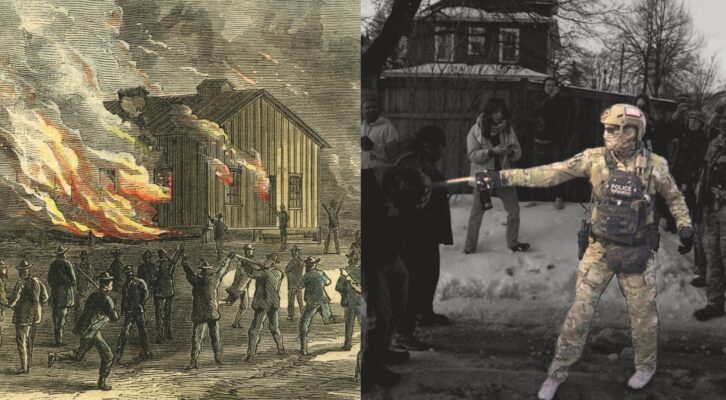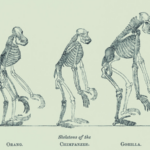As we settle into the second year of the pandemic, you may be asking yourself, what can I read this year that will utterly distract me while I wait for the vaccine? Crime fans, you’re in luck, as 2021 brings some of the most scintillating, thrilling, and suspenseful crime stories ever published. Some of the trends for the year include: a continuing golden age of women writing spy fiction, a new surge of rural noirs, and a vindication of psychological thrillers in which those who ignore women get their comeuppance. There’s also a panoply of evil twins, clones, and doubles, not to mention an influx of temps and new mothers, as our identities grow less stable and we find ourselves increasingly subsumed to the labels placed upon us rather than those we choose for ourselves. The Girl In the Title is saved by new usage, and the gothic revival continues. In short, it’s a banner year for our beloved genre, and the perfect year to indulge.
Publication dates are subject to change. Please check bookshop.org for the exact publication date of each title.
___________________________________
January
___________________________________

Kwei Quartey, Sleep Well, My Lady
(Soho)
In Kwei Quartey’s second book to feature Emma Djan, the young private eye is hired to investigate the murder of famed fashion designer Lady Araba. The killing was pinned on her chauffeur, but the victim’s beloved aunt is still searching for answers, and she suspects both Lady Araba’s lover and father of knowing more than they’ve let on. Corruption and blackmail have prevented the police from adequately investigating the crime, and it’s up to Emma and her agency to find the true culprit. Quartey’s work brings vivid life to his Ghanaian characters and setting, while reminding us that no matter the location, motivations for murder are the same everywhere. –Molly Odintz, CrimeReads Senior Editor

Eliza Jane Brazier, If I Disappear
(Berkley)
Sera works a dead-end job, has few friends, and spends her spare time obsessively listening to her favorite true crime podcast. When the host, Rachel, goes missing, Sera sets off to find her, and in the process, to shed her old self. She heads to the isolated California ranch that served as homestead and recording studio for the missing investigator, and gets hired on by Rachel’s creepy family to help out for the summer. Soon enough, Sera finds herself out of her depth as she begins to understand the dark secrets behind her bucolic new crash pad. –MO
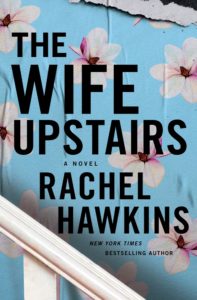
Rachel Hawkins, The Wife Upstairs
(St Martins)
A dog walker meets a brooding recent widower and gets involved in a tumultuous relationship, quickly becoming the subject of the town’s gossip, where the wife’s disappearance is also frequently discussed, along with the disappearance of her best friend, both lost in a nearby lake. What are those thumps she’s hearing from somewhere in the house? And what really happened to her new beau’s former lover? The ending was genuinely surprising, and I don’t say that a lot. –MO
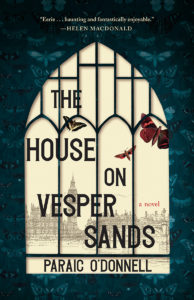
Paraic O’Donnell, The House on Vesper Sands
(Tin House)
O’Donnell has crafted a truly marvelous and beguiling vision of Victorian London, a mystery and a supernatural exploration, and a meditation on love and knowledge and the passage of time rolled into one captivating story about an unlikely pair of would-be sleuths driven by very different motivations to follow the connective tissue between a series of deaths. The House on Vesper Sands is poised to be one of the year’s breakout novels and confirms O’Donnell as a major talent. –Dwyer Murphy, CrimeReads Editor-in-Chief
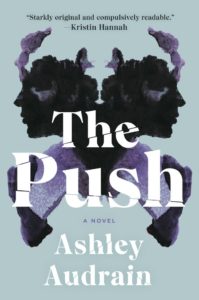
Ashley Audrain, The Push
(Pamela Dorman)
In Ashley Audrain’s slow-burn suspense thriller about motherhood, Blythe Connor doesn’t have much of an idea about how things are supposed to go–after all, her own mother left when she was a young child. She’s determined to be the perfect mother she never had, but she can’t ignore the worries caused by her eldest’s many outbursts. Something seems…off, about the child, something that she’s never felt about her darling youngest. As her checked-out husband reassures her that everything is fine, Blythe becomes increasingly certain that things are far from okay. –MO
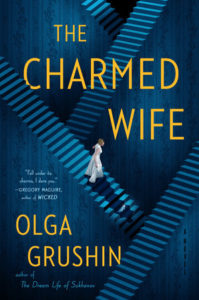
Olga Grushin, The Charmed Wife
(Putnam)
I’m always here for twisted literary retellings of classic fairy tales—in this one, Cinderella is thirteen and a half years into her marriage to Prince Charming, and feels the need to seek the help of the local witch to fix what’s gone wrong. . . that is, she wants to kill him. Sign me up, baby. –Emily Temple, Lit Hub managing editor

Emma Rous, The Perfect Guests
(Berkley)
Whenever a book has a swimming pool on the cover, its code for the violent unraveling of respectability in the face of danger—even Keith Haring’s Los Angeles paintings hide an undercurrent of menace in the electric blue water. In Emma Rous’ suspenseful new thriller, split between two timelines, a teenage girl in the 1980s finds herself out of her depth with her new friends, while in the present (or, like, pre-pandemic present), an actress prepares to attend a country party at a vast estate. Both women are cruelly manipulated by the wealthy as part of a sick game, which makes this book a perfect companion to the movie Ready or Not. –MO
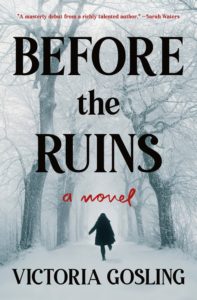
Victoria Gosling, Before the Ruins
(Henry Holt)
Gosling’s atmospheric thriller is centered on a fabulous, abandoned estate, where four strangers on the cusp of adulthood once spent a magical summer exploring, bonding, and playing increasingly dangerous games. Decades later, one is missing, and the others must reopen old wounds in order to track down their errant friend. Gosling uses her richly ruinous setting as a jumping-off point to examine class, innocence, morality, and loss. –MO
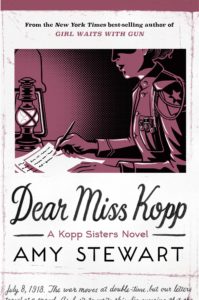
Amy Stewart, Dear Miss Kopp
(HMH)
Amy Stewart may have gotten her start as a science and nature writer, but she’s just as lively and entertaining when she’s crafting historical mysteries. In the latest book to feature the fabulous real life Kopp sisters, the eldest of whom was the first female Under Sheriff in the United States, World War I is in full swing and the sisters immediately get roped into quite a few wartime intrigues. –MO
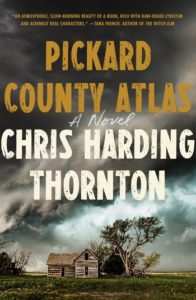
Chris Harding Thornton, Pickard County Atlas
(MCD)
In the midst of a heat wave in 1978, the residents of Pickard County, Nebraska, are finding it hard to keep a cool head. When the family of a long-missing child decides to finally erect a headstone, it provides not comfort but a catalyst to the townspeople, as long-simmering rivalries and resentments spark into full-size wars. Chris Harding Thornton has crafted a lyrical ode to a harsh landscape that deserves its place in the canon of rural noir. –MO
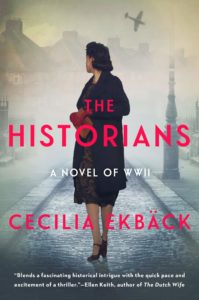
Cecilia Ekbäck, The Historians
translated by Saskia Maarleveld
(Harper Perennial)
In neutral wartime Sweden, intrigue is the name of the game. A brilliant historian has been murdered, her thesis on Scandinavian supremacy a new weapon to be used against neutrality. Her coterie of fellow thinkers, led by a charismatic and dangerous ideologue, set out to discover what happened to their fallen comrade. –MO
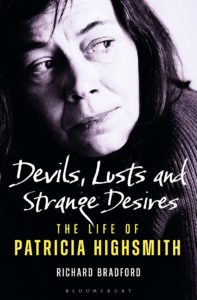
Richard Bradford, Devils, Lusts and Strange Desires: The Life of Patricia Highsmith
(Bloomsbury)
Richard Bradford’s new work about Patricia Highsmith isn’t a straightforward biography, but a literary exploration of Highsmith’s many destructive affairs and the influence they had on her dark classics. I’m sure this isn’t news to the folks reading this blurb, but Patricia Highsmith was a psychopathic, racist, antisemitic, alcoholic who preferred snails to people, slept with seemingly every artistic lesbian of the 20th century, and vacillated between idolizing her partners and bringing them close to suicide. Also, she played a drinking game at Yaddo with Chester Himes and a British poet that involved consuming more than 10 martinis in a single night. Damn, Patricia. –MO

Ellery Lloyd, People Like Her
(Harper)
Not since reading Gone Girl have I found such a satisfyingly furious speech tucked in the midst of a thriller. Ellery Lloyd is the pen name for married couple Collette Lyons and Paul Vlitos, and something about knowing this book was written by a loving couple makes the gleeful cynicism of People Like Her that much more delightful. In this snarky take on the influencer era, a mommy blogger is being stalked by an angry fan, but People Like Her is much more than a tale of obsession—it also lays bare the contrast between curated screen lives and the messy truth underneath. –MO
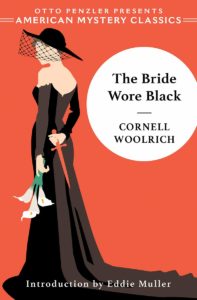
Cornell Woolrich, The Bride Wore Black
(American Mystery Classics)
I’m a huge fan of Woolrich’s classic novel The Bride War Black, a stirring and emotionally resonant thriller of vengeance that became a film by Truffaut that would directly inspired Tarantino’s Kill Bill films. I couldn’t be happier to see it newly reissued and with a fantastic original introduction from Eddie Muller. –MO
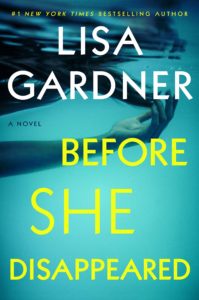
(Dutton)
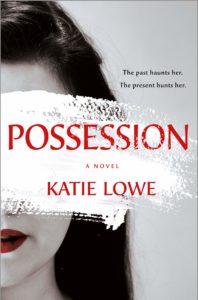
Katie Lowe, Possession
(St Martin’s)
Ten years after being cleared as a suspect for her husband’s murder, Hannah is living the quiet life with her new partner and teenage daughter, far from her hometown. All of that changes, however, when the host of a podcast dedicated to exonerating the wrongfully accused decides to devote an entire season to clearing the man accused of the crime. Hannah’s carefully rebuilt veneer is stripped away episode by episode as her loved ones begin to question what really happened that night. –MO
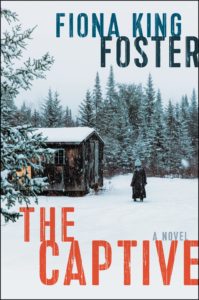
Fiona King Foster, The Captive
(Ecco)
In this intense literary thriller, a family ekes out a precarious but peaceful living on a remote farm in a dystopian future. As is often the case in thrillers, an interloper arrives to disturb the careful balance in the household—in this case, it is an escaped prisoner whose chaotic presence will most likely cause all sorts of revelations to come to the fore. –MO
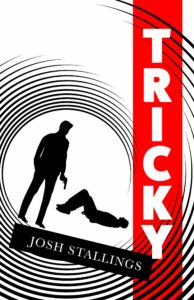
Josh Stallings, Tricky
(Agora)
Punk-rock poet Josh Stallings has written an intense new crime novel about the power of people to change. In Tricky, a former gang member is accused of beating a man with Down’s Syndrome to death. The accused is also intellectually disabled after brain injuries sustained from a beating, and it’s up to Stallings’ narrator to determine what happened. Tricky is dedicated to Josh Stallings’ own son, who is intellectually disabled. A moral tour-de-force that explores essential questions of reform and justice, Tricky is not to be missed. –MO
___________________________________
February
___________________________________
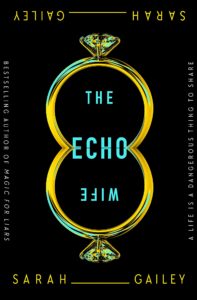
Sarah Gailey, The Echo Wife
(Tor)
Sarah Gailey’s The Echo Wife is SO GOOD. Like, I don’t know the last time I read anything this well-plotted. In The Echo Wife, a scientist renowned for her skills in cloning finds out that her husband has been cheating on her—with her clone. When the clone kills the husband, the scientist has to cover it up, or else the investigation might ruin her reputation and cause the community to question the efficacy of her research. She’s also got a certain level of sympathy for her genetic twin; her husband’s clumsy attempt to grow the perfect wife hobbled his creation and made her miserable. Innumerable plot twists ensue, leading to a perfect set-piece of an ending. –MO
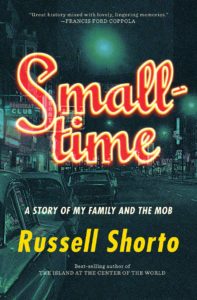
Russell Shorto, Smalltime: A Story of My Family and the Mob
(Norton)
Growing up, Russell Shorto knew he was named for Russ Shorto, a mobster who ran a small criminal empire in Johnstown, Pennsylvania, but it wasn’t until recently that he started to get curious enough to look into the matter. Smalltime promises to be a lively journey into the illicit pastimes of factory towns in decades gone by, and the charismatic leaders of the underworld who lived to provide such entertainment. –MO

Walter Mosely, Blood Grove
(Mulholland)
Mosely’s long-running Easy Rawlins series is now up to 1969. The bemused Easy is enjoying the sexual revolution while tolerating the hippies’ drugged out behavior and constant virtue signaling when he’s hired by a traumatized veteran to track down an elusive attacker from Easy’s part of town. Meanwhile, Easy’s worried about his adopted daughter, Feather, whose birth family has suddenly evinced an interest in her well-being, and playing affable bestie to his psycho ex-machina Mouse as the two find themselves confronting a case that goes right to the innermost contradictions of the flower power era. –MO
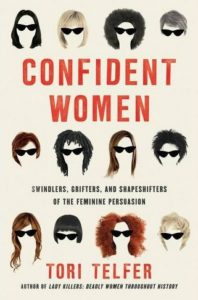
TRUE CRIME SPOTLIGHT:
Tori Telfer, Confident Women: Swindlers, Grifters, and Shapeshifters of the Female Persuasion
(Harper Perennial)
I love, love, love stories about con artists so I’m especially excited for Tori Telfer’s roundup of LADY fraudsters–a comprehensive, discursive roster whose first entrant dates all the way to the 1700s. –OR
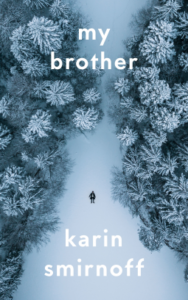
Karin Smirnoff, My Brother
(Pushkin)
In Smirnoff’s bleak and beautiful rural noir, narrator Jana returns to her home town with an agonizing task: to try to keep her brother from drinking himself to death, as they both confront the demons of their childhood. Jana takes up with a neighbor suspected of killing his wife, unsure why she finds their connection so compelling; meanwhile, she begins working in eldercare and palliative care in the village, where she encounters those who are ready to finally fill in the gaps in her memories, no matter the consequences. –MO

Catie Disabato, U Up?
(Melville House)
I adored Catie Disabato’s wildly playful debut The Ghost Network, detailing a fan’s obsessive quest to locate a missing pop star named Molly Metropolis, rumored to have vanished into a lost section of the Chicago train system, and I had a lot of fun drawing the eye from the cover on a staff selection. Now, I’m close to finishing U Up?, her ice-cold sophomore novel of love and loss in LA, and I’m rather annoyed at having to stop reading it to write this blurb. In U Up?, the Very Online and very traumatized Eve can see ghosts, and one of them—her best friend, Miggy—keeps up from the other side by texting. A lot. Eve’s other best friend is missing on the anniversary of Miggy’s death, and Eve must confront her fears, her ex-girlfriends, and many, many ghosts, as she winds through the vibrant LA queer scene, refreshing her Instagram and delving deep into her soul in search of a terrible truth. –MO
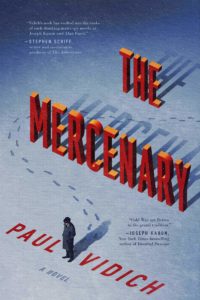
Paul Vidich, The Mercenary
(Pegasus)
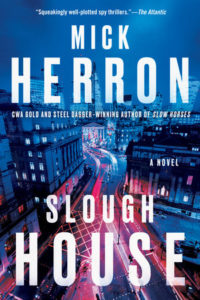
Mick Herron, Slough House
(Soho)
Mick Herron’s Slough House series has quietly become of the greatest spy series the world has ever seen. And now a soon-to-be television adaptation starring Gary Oldman should make Herron and his heroes into household names. In the meantime, old fans and new readers alike should enjoy Herron’s latest in the series, as the denizens of Slough House, the headquarters for sidelined and demoted spies, must solve a series of murders targeting their own as Brexit threatens to dismantle Slough House completely. Also, for those who wish to start from the beginning, you can find the first book in the series on offer for only ten bucks! –MO
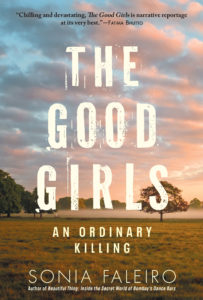
True Crime Spotlight
Sonia Faleiro, The Good Girls: An Ordinary Killing
(Grove)
Sonia Faleiro is a narrative journalist with a talent for nuance and ambiguity, and in her new work of true crime, there are no easy answers—only hard conversations that the world must, and should, be having. The girls of Faleiro’s title, two teenagers growing up in a remote agricultural town in the state of Uttar Pradash, are murdered in the fields around their village after weeks of rumors and escalating tension. The Good Girls will not be a happy story. But it is an essential story. –MO
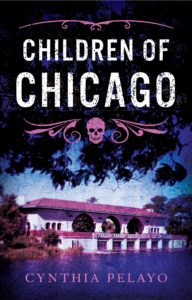
Cynthia Pelayo, The Children of Chicago
(Agora)
Cynthia Pelayo has crafted a twisted new take on an old folktale in The Children of Chicago, where a serial killer known as the Pied Piper has returned after a long hiatus, and it’s up to a policewoman with a dark secret of her own to take him down. –MO
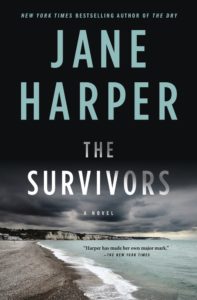
Jane Harper, The Survivors
(Flatiron)
Kieran Elliott’s been away from his small seaside town for over a decade, but his father’s illness brings him home to face a harsh reckoning. Aussie author Jane Harper is one of the most exciting new voices in crime fiction, and I can’t wait to dive into her fourth suspense thriller. –MO
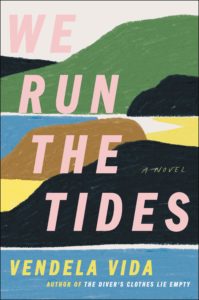
Vendela Vida, We Run the Tides
Ecco
If you can’t get enough 80s nostalgia (and I count myself among you), Vendela Vida’s latest will scratch that itch. In this tense story of teen female friendship and betrayal in the pre–tech bro years of San Francisco, BFFs Eulabee and Maria Fabiola have a dramatic falling out that’s followed by Maria Fabiola’s disappearance. Early readers have been responding with ALL CAPS–level excitement; my curiosity is suitably piqued. –Eliza Smith, Lit Hub Audience Management Editor
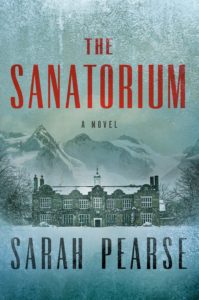
Sarah Pearse, The Sanatorium
(Pamela Dorman Books)
Sarah Pearse’s atmospheric thriller involves a naive hotelier destroyed by his own hubris when he attempts to turn the ruins of a sanatorium into a swanky new destination for travelers. First, his architect vanishes. Then, the staff start disappearing. And then, an avalanche traps the rest of the staff, to be picked off one by one. Lucky for the rest of the hotel’s trapped denizens, there’s a British cop visiting, and she’s determined to hunt down the attacker, even as the weather rages outside and threatens to obliterate the entire cast in one fell swoop. –MO

Cate Quinn, Black Widows
(Sourcebooks)
Black Widows is being billed as “Big Love with murder,” and while that right there is plenty reason to pick up this title, I can also confirm, after reading it very, very, quickly, that it also has an absurdly satisfying ending. A compulsively readable page-turner with a surprisingly heart-warming message, Cate Quinn’s latest is not to be missed. –MO

Abigail Dean, Girl A
(Viking)
This one is so effed up. Abigail Dean’s intense debut begins with a settling of affairs: Dean’s central character, Lex Gracie, has been named as the executor of her mother’s will, and her new duties bring up some horrific childhood memories: she and her siblings grew up in a House of Horrors (the story is based loosely on the Turpin Family), where they were chained to their beds and starved until Lex was able to escape and rescue the others. In order to settle her mother’s affairs, Lex must reconnect with her brothers and sisters, who are all dealing with long-term traumas and deep-seated resentments of their own, as the world outside continues to exploit them for their memories. –MO
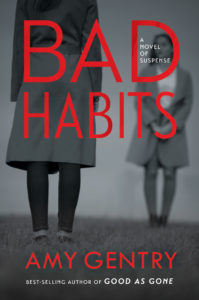
Amy Gentry, Bad Habits
(HMH)
A triumphant convention dissolves into a personal nightmare as a literature professor finds herself confronted by past demons and fis orced to acknowledge some uncomfortable truths. In her graduate student days, she’d been a member of an elite interdisciplinary school known as “The Program,” led by a charismatic and ruthless academic with access to a coveted research grant used to pit students against each other. I dub this one “academic gothic.” –MO
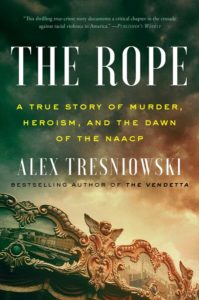
True Crime Spotlight
Alex Tresniowski, The Rope: A True Story of Murder, Heroism, and the Dawn of the NAACP
(S&S/37INK)
In this riveting true story, Alex Tresniowski tells the intertwined stories of a crusading reporter, an innovative detective, and a man unjustly imprisoned. When Marie Smith was murdered in a New Jersey resort community in 1910, town leaders immediately tried to pin the murder on a local Black man. Only thanks to the diligent efforts of a pioneering detective and a nascent civil rights movement was the true culprit discovered and the falsely accused suspect set free. You’ll read this in a night, I promise! –MO

Nalini Singh, Quiet In Her Bones
(Berkley)
Kiwi crime writer Nalini Singh thrilled the international crime scene with her sunburnt noir A Madness of Sunshine, and her latest work is just as stunning. In a wealthy New Zealand enclave, Aarav Rai, stuck in his father’s home while recuperating after a car accident, couldn’t be more miserable, even before the discovery of his long-missing mother’s corpse. While he should rest (especially given his medications), he’s not going to give his foggy mind a break until he discovers what really happened 10 years before. Full of twists, turns, and genuine emotion, Quiet in Her Bones cements Singh’s place in the modern pantheon of suspense. –MO
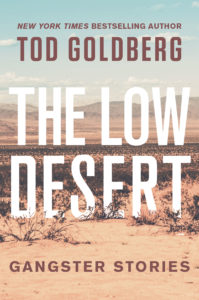
Tod Goldberg, The Low Desert
(Counterpoint)
Tod Goldberg is the greatest noir writer you haven’t read (or maybe you have read him, and I’m just super behind). The Low Desert, set in Goldberg’s Gangsterland universe, is a story collection that the publisher describes as equal parts Raymond Carver and Elmore Leonard. The Low Desert features Goldberg’s hit-man-turned-rabbi Sal Cupertine and a cast of tangentially related characters as they each face alienation, ambiguity, and uncertainty. –MO
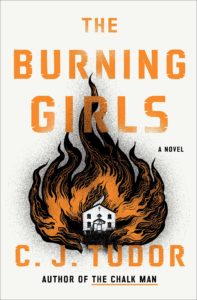
C.J. Tudor, The Burning Girls
(Ballantine)
C.J. Tudor is turning out some of the best supernatural fiction around. And in The Burning Girls, her signature blend of self-aware characters and ancient evils is on full display. A reverend and her daughter have moved to the picturesque village of Chapel Croft for a new beginning, but the quaint town has a dark past: it’s been the setting for historical slaughter, unexplained disappearances, and many unanswered questions. –MO
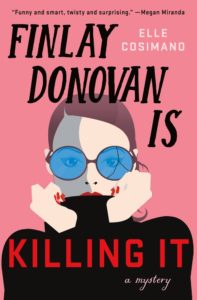
Elle Cosimano, Finley Donovan is Killing It
(Minotaur)
This book is so. much. fun! When an author is mistaken for a hitman after a particularly bloody plotting conversation with her agent, she vows to not take the woman up on her $50,000 offer to off her husband. Her piled up bills, however, disagree, and with some help from her children’s ex-babysitter, the writer is soon well on her way to a new career as a contract killer. –MO
___________________________________
March
___________________________________
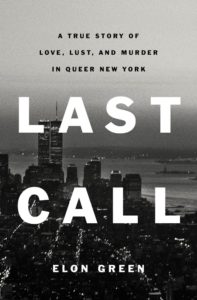
TRUE CRIME SPOTLIGHT
Elon Green, Last Call: A True Story of Love, Lust, and Queer New York
(Celadon)
Elon Green’s Last Call is the most recent addition to a new wave of true crime exposing horrific violence committed against the GLBTQ community, the institutional indifference that allowed these crimes to continue, and the community activists who made sure these crimes got solved. Last Call follows activists and investigators as they attempt to track down a killer whose skillful dismemberment of his victims points to a medical background. Each victim had a complicated relationship with their identity, and each had been lured to their death by a charming predator based in a discrete piano bar. Elon Green paints a disturbing portrait of a decade—the 1990s—in which a community devastated by a plague simultaneously experienced a rise in hate crimes justified by the “gay panic” defense, and faced a scattershot police response to safety concerns. –MO

(Putnam)

Alexandra Andrews, Who is Maude Dixon?
(Little, Brown)
In Alexandra Andrews’ biting debut, full of the kinds of names that should appear in fiction, young publishing assistant Florence blows up her career after her boss sleeps with her, and finds a tentative lifeline with a new job as the assistant to the mysterious Helen, who took the literary world by storm under the pseudonym Maude Dixon, but who is now struggling to complete her next novel. The two head to Morocco for a research trip, but after a deadly car crash, only one wakes up in the hospital. Is she Maude Dixon, or is she about to become Maude Dixon? –MO

Femi Kayode, Lightseekers
(Mulholland)
Lightseekers is a dynamic and feverishly excited thrill ride of a novel. Kayode’s psychologist narrator is headed to a small college town in the heart of Nigeria to investigate the murders of three students. Why were they murdered? Why did the whole town seem to participate in the killings? And what could possibly have been their motive? Perfect for those who grew up in towns full of very loud college students… –MO
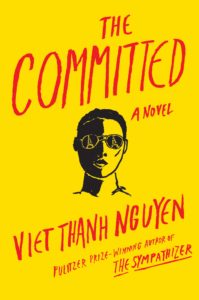
Viet Thanh Nguyen, The Committed
(Grove Press)
The much-anticipated sequel to 2016’s Pulitzer Prize-winning The Sympathizer, The Committed picks up the story of Nguyen’s anonymous north-Vietnamese protagonist, reeling from a brutal re-education at the hands of his ex-best friend, as he arrives in Paris as a refugee in the early 1980s and embarks on a new life as a drug dealer and hanger-on to a set of left-wing intellectuals. A master stylist with blistering intellect, Nguyen is capable of exploring big ideas at a page-turning pace. –Emily Firetog, Lit Hub Deputy Editor

Flynn Berry, A Northern Spy
(Viking)
From Edgar-winning author Flynn Berry comes a new novel about the continued tensions in Northern Ireland. A Belfast-based producer at the BBC, Tessa is shocked to see her own sister Marian captured on footage as being part of a violent IRA-related raid. She embarks on an inquiry to find out what has happened to her sister, and how on earth she could be involved, but lands in a more dangerous circumstance than she could have imagined. –OR
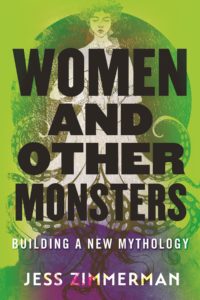
LITERARY CRITICISM SPOTLIGHT
Jess Zimmerman, Women and Other Monsters: Building a New Mythology
(Beacon)
Electric Lit editor-in-chief Jess Zimmerman offers up a rallying cry for women: to be hungry, feral, ambitious—in short, to be monstrous. Framing her manifesto through the stories of eleven female monsters from Greek mythology, Zimmerman demonstrates the agency and power of clawing through social constructions. Carmen Maria Machado calls it “muscular and dangerous,” and poised to become a feminist classic. –ES

Wendy Heard, She’s Too Pretty to Burn
(Henry Holt)
Wendy Heard writes some of the coolest thrillers around, and her first YA novel continues the trend as we follow the destructive spiral of an intense romance between a mediocre photographer and an extreme performance artist. There’s something about crime fiction that just makes performance art so much easier to understand (at least for me, anyway). –MO
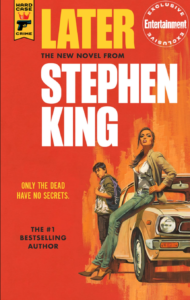
Stephen King, Later
(Hard Case Crime)
As a kid growing up in the 70s, I wore out the ink on my Stephen King paperbacks (Carrie, Salem’s Lot, Night Shift), reading terrifying page after terrifying page with a flashlight under my bunkbed tent. King’s new novel, Later, has the tenor of such a book but grittier and crime-focused, as the pulpy cover suggests. Jamie Conklin, a teenage boy with a single mom, has “abilities” that could help others. But there’s a Faustian bargain in the mix. Does he help the NYPD or is there too much at stake? There’s also a novel within the novel that’s sure to add complexity to this connect-the-dots tale, but it’s also compassionate and tender, as any true Stephen King book tends to be; exploitation of that tenderness always contains the real horror or crime. He’s been cagey about the book’s details (there’s been mumblings about things coming from beyond the grave), which adds to the mystique, so naturally, you will find me in March, flashlight in hand. –Kerri Arsenault, Lit Hub Contributing Editor
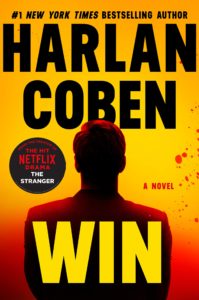
Harlan Coben, Win
(Grand Central)
Harlan Coben’s books are full of the thrilling, the unexpected, the twisty, and the memorable. Win introduces a new aristocratic detective, Windsor Horne Lockwood III, who’s ready to put his considerable fortune towards finding the culprits behind a long-ago robbery of the family home after some of the missing artifacts turn up next to a dead body. –MO
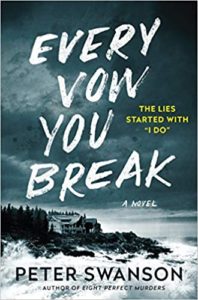
Peter Swanson, Every Vow You Break
(William Morrow)
Swanson follows up on last year’s Eight Perfect Murders with another taut, insightful psychological thriller, this time telling the story of a honeymoon gone terribly wrong when a man from the bride’s past turns up. The setting, an island off the coast of Maine, is richly drawn and serves to turn up the intensity on an increasingly sinister situation. Swanson brings the story’s natural gothic notes with great skill. –DM

Sara Davis, The Scapegoat
(FSG)
In Sara Davis’s debut novel, N investigates the circumstances of his father’s death, which leads him to a mysterious hotel built over a former Spanish mission. As he untangles the mystery, he begins hallucinating about his past—and worrying if he’s playing into the hands of a larger conspiracy. Sounds spooky and compelling; and if it’s half as good as Davis’s LARB essay on the TV show Laguna Beach, count me in. –Walker Caplan, Lit Hub Staff Writer
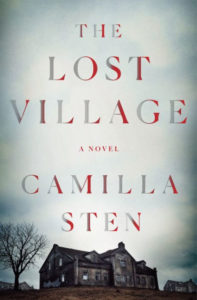
Camilla Sten, The Lost Village
(Minotaur)
The folk horror wave continues! Thank god for Midsommar and all the many wonderful works that are now able to be compared to it. In The Lost Village, a documentary filmmaker is drawn to uncovering the secrets of an old mining village where nearly all the residents have vanished, including her own family. What ancient evils lurk in the hollowed-out earth? The filmmaker and her small crew, camped out in the disintegrating town, may themselves fall victim to terrors before they can discover any truths. The Lost Village is also being compared to the Blair Witch Project (sans snot). –MO

Nadine Matheson, The Jigsaw Man
(Hanover Square)
In a gritty modern London, DI Angelica Henley gets a gruesome new case after body parts from two different people are discovered at the side of the river. Do the murders have anything to do with the infamous Jigsaw Man, who’s been imprisoned for years? Is it a copycat killer, or is the Jigsaw Man sending directives to an accomplice from the inside? I’m looking forward to tearing through this fiendishly clever thriller. –MO
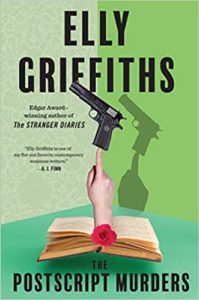
Elly Griffiths, The Post-Script Murders
(HMH)
In Elly Griffiths’ new metafiction mystery—billed as perfect for fans of Anthony Horowitz and Agatha Christie—an elderly woman dies of a seemingly natural death, but the caretaker tasked with clearing out her apartment notices a number of crime novels dedicated to the deceased. The police aren’t particularly concerned, until a break-in confirms the caretaker’s suspicions that there was something more to the woman’s death.—MO

Donna Leon, Transient Desires
(Atlantic Monthly Press)
Make way for the thirtieth novel in Leon’s beloved, bestselling series about Commissario Guido Brunetti. Our hero is intrigued by a strange crime that falls just out of his jurisdiction, a boating accident that leaves two American women hospitalized, and causes their two male Italian companions to flee. –OR
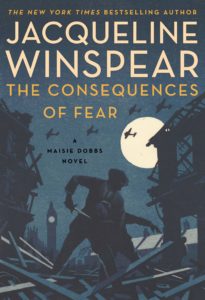
Jacqueline Winspear, The Consequences of Fear
(Harper)
Winspear’s Maisie Dobbs series has followed the former-nurse-turned-private-detective from the First World War all the way up to the Second. In The Consequences of Fear, it’s 1941, and a young message runner for the War Office turns to Maisie for help after he witnesses a murder and suspects his government masters may have something to do with it. We’re that Maisie will prove, in the end, to be QUITE up to the challenge. And of course, she’s got her own work for the secret service to tend to… –MO
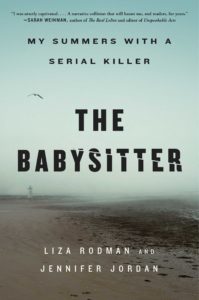
True Crime Spotlight
Liza Rodman and Jennifer Jordan, The Babysitter: My Summers With a Serial Killer
(Atria)
Serial killers are often perfectly capable of kindness, even love, for those closest to them; they can be spouses, parents, pet owners, community leaders, and even, as is the case in this book, a beloved babysitter. Liza Rodman grew up spending summers on Cape Cod, where a local handyman would look after her and her sister. He’d even take Rodman to his special garden in the woods—the final resting place of many of his victims. The Babysitter is being compared to Anne Rule’s seminal classic The Stranger Beside Me, for good reason. I hope none of my babysitters turn out to be serial killers….okay, maybe the one with the eyebrow piercing was, but hey, it was the 90s. –MO
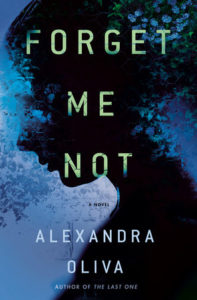
Alexandra Oliva, Forget Me Not
(Ballantine)
Linda grew up in a walled garden, near-feral at the time of her escape at age 15, and is slowly adjusting to a society where gadgetry has replaced nature. Known as “clone girl”, Linda was the product of her mother’s desperate attempt to replace her dead daughter with a child exactly like her. When Linda befriends a new neighbor, and her old home burns to the ground, it’s time for her to return and put silence to the ghosts of her past. –MO
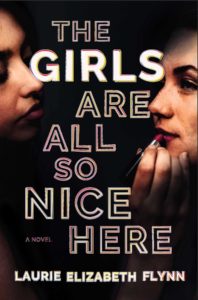
Laurie Elizabeth Flynn, The Girls Are All So Nice Here
(Simon & Schuster)
Since I almost went to Wesleyan, but pivoted at the last second to attend UT Austin (I know, big contrast there), this slow-burn novel of long-ago crimes and long-delayed consequences is right up my alley. In what feels like Romy and Michelle’s High School Reunion if it was written by Donna Tartt, a group of Wesleyan alumni gather for their 10 year reunion—and some of the attendees aren’t there to celebrate. –MO
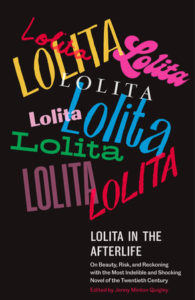
LITERARY CRITICISM SPOTLIGHT:
Lolita in the Afterlife: On Beauty, Risk, and Reckoning with the Most Shocking Novel of the Twentieth Century, edited by Jenny Minton Quigley
(Vintage)
Jenny Minton Quigley brings together many of the most accomplished scholars of today in her new collection dedicated to deciphering the long-term impact of the 20th century’s most controversial novel. Featuring essays from Sarah Weinman, Roxane Gay, Kate Elizabeth Russell, and many more, Lolita in the Afterlife is a thoughtful new addition to Nabokov scholarship that reaches deep into the American psyche. –MO

Hervé Le Corre, In the Shadow of the Fire
Translated by Tina Kover
(Europa)
I was stunned by Hervé Le Corre’s After the War, featuring a quest for vengeance against Nazi collaborators set against the backdrop of the Algerian War, and his new historical crime novel, In the Shadow of the Fire, should be just as gripping. Set during the Paris Commune’s brief but glorious existence in 1871, Le Corre’s latest tells the story of a missing woman, and the many men who set out to find her, each representing a different faction in a fractured Paris. Le Corre captures not only the events of the era, but the mindset, the prejudices, and the blind spots as well. –MO

S.J. Bennett, The Windsor Knot
(William Morrow)
Wondering what to look forward to in a year that’s otherwise bound only to be slightly less challenging than the year before? How about Queen Elizabeth solving mysteries? In this charming tale of murder and intrigue at Buckingham Palace, the Queen is preparing to celebrate her 90th birthday when a Russian pianist is found murdered in the royal home. As the British royal is wont to do, Queen Elizabeth immediately rolls up her sleeves and gets to work on solving the case. After all, if you want a job done properly, best to do it yourself. –MO

TRUE CRIME SPOTLIGHT
Emma Southon, A Fatal Thing Happened on the Way to the Forum: Murder in Ancient Rome
(Abrams)
Emma Southon’s highly entertaining saga of murder and mayhem in Ancient Rome is a guide to a society with a completely different concept of killing than our own (and one primarily based on property value and assumed personal risk, rather than morality). Like Mary Beard’s SPQR, A Fatal Thing Happened revels in the contradictions between Rome’s mythology and the demands of a logical society. Plus, that title…irresistible! –MO
___________________________________
April
___________________________________

Geling Yan, The Secret Talker
(HarperVia)
Geling Yan has crafted a steamy slow-burn psychological thriller in The Secret Talker. A woman trapped in an unhappy marriage begins to receive erotic messages from a stranger online, who appears to be stalking her every move. And so, the woman decides to stalk her stalker, in a cat and mouse game that will keep you guessing to the last page. –MO
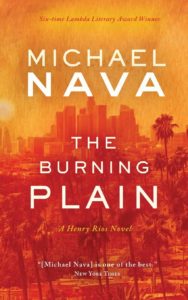
Michael Nava, The Burning Plain
(Persigo Press)
Michael Nava’s latest Henry Rios mystery novel, set in the mid-80s, begins with scenes of the dying as the HIV pandemic rages with little government help for the suffering. Henry Rios is grieving the loss of his lover to HIV when he becomes a suspect in the murder of a young gay man, the latest in a string of killings in the gay community. As he seeks to clear his name and find the true killer, he’s also drawn into a vast conspiracy against HIV positive Angelenos based on true events. –MO
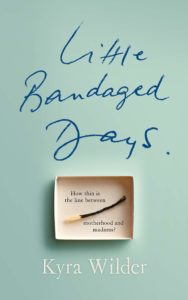
Kyra Wilder, Little Bandaged Days
(Overlook Press)
In this claustrophobic tale of cross-cultural confusion and alienation, a young mother accompanies her husband to his fancy new job in Switzerland. Once arrived, her husband’s long hours, her own sleepless nights, and the cold dismissal of the orderly Swiss begin to drive her towards an inexplicable and horrifying act. Like Jean Kwok’s Searching for Sylvie Lee, Kyra Wilder uses English accented by the strange and specific phrases of other cultures, for a disorienting take on language itself. –MO
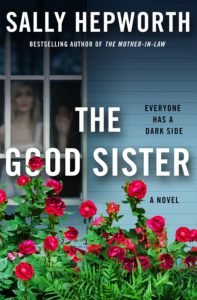
Sally Hepworth, The Good Sister
(Minotaur)
I cannot wait to read this book. In Hepworth’s latest, an awkward, shy librarian and her responsible, married twin sister are bound together by a traumatic childhood and dark secret. The librarian agrees to bear a child for her sister, who can’t conceive, but the search for a sperm donor tests the siblings’ careful balance of power and should lead to some pretty shocking reveals. Now all I gotta do is find my e-reader charger and I can actually read it.–MO
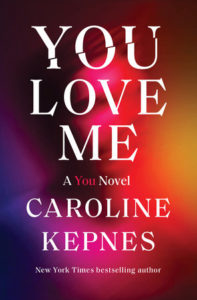
Caroline Kepnes, You Love Me
(Random House)
I couldn’t wait to dive into the new novel from Caroline Kepnes, the third in her saga of Joe the psychopathic bookseller and his many true loves, and even though an advanced reading copy for this one was rather hard to come by. In You Love Me, Joe is out of prison but cut off from his son with Love Quinn, as he embraces his new exile from California by stalking a new love interest—the local librarian, Mary Kay. MK is married to an aging rocker and is the mother of a teenage girl, but of course Joe is out to break down her relationships and worm his way into her soul, while self-justifying all the while. Kepnes’ savage takedowns of pretentious blowhards continues to make Joe a more culturally aware Dexter, or perhaps a more romantic and humorous Hannibal, as he pillories the bad taste of his rivals and victims. –MO

Kaoru Takamura, Lady Joker
Translated by Alison Markin Powell and Marie Iida
(Soho)
Kaoru Takamura’s magnum opus Lady Joker is already considered classic literature in her native Japan, where it has also been the subject of several adaptations since its mid-90s publication. This year, thanks to the tireless efforts of Soho Press and several translators, Lady Joker will finally appear in English, so we can all have a chance to read a work that earns frequent comparisons to L.A. Confidential in its scope. Lady Joker follows five racetrack regulars as they hatch a plan to kidnap a beer industry titan, seeking vengeance after one loses a grandchild and blames the death on the company’s discriminatory hiring practices. –MO
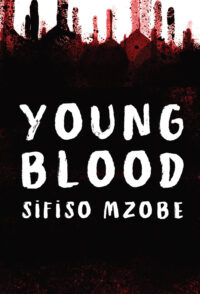
Sifiso Mzobe, Young Blood
(Catalyst Press)
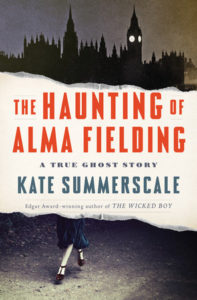
Kate Summerscale, The Haunting of Alma Fielding: A True Ghost Story
(Penguin Press)
From the author of the acclaimed Suspicions of Mr Whicher comes a new tale of hauntings, poltergeists, and spiritualism between the wars. Alma Fielding appears to be an ordinary housewife—aside from the household objects that go flying every which way around her. Renowned Hungarian medium Nandor Fodor, who fled rising antisemitism in Europe in the early 1920s before embarking on his long spiritualist career, is determined to help Alma with her unwelcome visitor. What follows is a fascinating story of repressed emotions, gendered hauntings, and an era defined as much by seances as new technologies. –MO
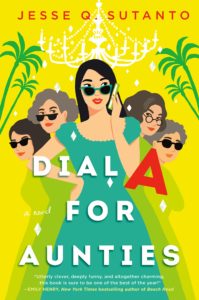
Jesse K Sutento, Dial A For Aunties
(Berkley)
Jesse K Sutento’s upcoming cozy has an irresistible tagline: Weekend at Bernies meets Crazy Rich Asians (with a little bit of Practical Magic thrown in). When Sutento’s unlucky-in-love heroine goes on a disastrous date that ends in the death of her suitor, she turns to family to help her cover up the crime. Will the murder get in the way of her family’s wedding planning business? And will Sutento’s charming lead get back together with the old flame she’ll be seeing at the family’s latest wedding extravaganza? And most importantly: WHAT’S IN THE DEEP FREEZER? –MO
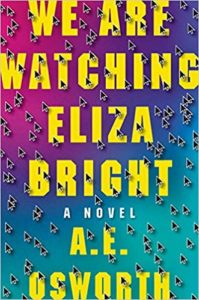
A.E. Osworth, We Are Watching Eliza Bright
(Grand Central)
Like The Guild, Osworth’s new novel is entertaining for gamers and noobs alike. Programmer Eliza Bright has just been promoted at her gaming company when she begins to encounter sexism from her coworkers. After she reports the harassment, her attackers turn to their beloved gaming community for vengeance, assaulting her in-game character and doxing her in real life. But Eliza Bright has some powerful allies, and she’s not going to go down without a fight. This one kind of reads like GamerGate as told by the guy who directed The Lives of Others. –MO

Chris Bohjahlian, Hour of the Witch
(Doubleday)
There are a whole lot of books coming out this year about witches, and each one looks truly magnificent. In Bohjalian’s latest, a young Puritan woman trapped in a loveless marriage in 17th century Boston is desperate to get out of her unpleasant union. But will her methods subject her to scrutiny and suspicion that prove to be even more dangerous than her husband? Chris Bohjahlian is also the author of Water Witches, a story of dowsers, that’s recently been released in a new 25th anniversary edition if you can’t wait till March to get your witch on… –MO
___________________________________
May
___________________________________
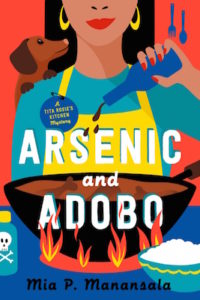
Mia P. Manansala, Arsenic and Adobo
(Berkley)
Mia P. Manansala won the Eleanor Taylor Bland Award from Sisters in Crime for her early work on her debut, and I couldn’t be happier to see her creative new cozy series come to fruition. In Arsenic and Adobo, Manansala has all the ingredients for a fantastic culinary cozy—a recently returned daughter, meddling relatives, a failing restaurant, and a dead restaurant critic. Also, try to read this one without ordering food online. I dare you. –MO
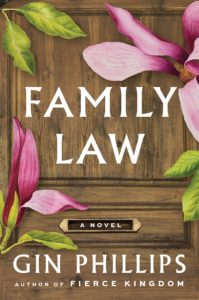
Gin Phillips, Family Law
(Viking)
What could be more noir than a story about a divorce lawyer in 1980s Alabama? In Gin Phillips’ new slow-burn thriller, a feminist divorce attorney is already reeling from the Reagan-era backlash against women’s rights when she becomes an accidental mentor to a struggling teenage girl looking for a different vision of femininity. When her car is vandalized and she begins to receive threats, the lawyer becomes torn between the dangers of her profession and her new role as mentor. Gin Phillips is the author of the lyrical and bizarre Fierce Kingdom, and Family Law promises to be just as stunning. –MO
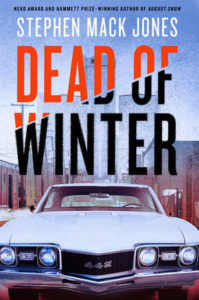
Stephen Mack Jones, Dead of Winter
(Soho)
When Detroit ex-cop August Snow is invited to a meeting with a dying business owner in his native neighborhood of Mexicantown, he is surprised to learn that the man is being blackmailed into selling his company, Authentico Foods, and even more surprised when the man begs August to buy it. But August doesn’t want to be a grocer. He’d prefer to figure out who’s behind this all–who’s threatening the neighborhood he loves.–OR

Natasha Pulley, The Kingdoms
(Bloomsbury)
Okay, so this one is really, really not a mystery, but I loved it too much to not include on this list. Also, it’s got mystery-esque elements to it! A man wakes up with no memory of his past life, in an alternate version of history where Napoleon won and the English have been enslaved by the French. He receives a postcard of a lighthouse, encouraging him to come home, and makes a pilgrimage to the remote Hebrides, where he discovers a portal to the past and, at last, the key to his identity. –MO
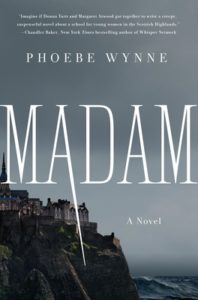
Phoebe Wynne, Madam
(St. Martin’s Press)
Madam reads like The Secret History if it had taken place in a far more appropriately gothic setting—a girls boarding school in the Scottish highlands, where a new classics teacher finds her embrace of modern education stymied by the school’s traditional outlook. And then, of course, there’s the question of what happened to the old classics teacher, and that question opens up other questions about the gothic secrets hidden within the school’s stone walls. Madam reads like a way more feminist version of Rebecca, and should be one of the most atmospheric and intense debuts of the year. –MO
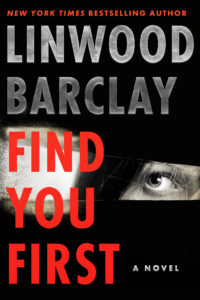
Linwood Barclay, Find You First
(William Morrow)
Linwood Barclay is a high-concept thriller writer, and his latest melds traditional mystery tropes and high tech possibilities as a dying millionaire seeks to find the children he fathered via sperm donation. Some, he worries, will inherit his rare genetic disease, while others may end up with a sizable chunk of his fortune. Meanwhile, his filmmaker daughter has been tracking him down, while his other scattered potential heirs are dropping like flies. –MO
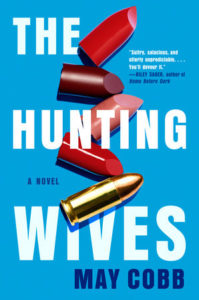
May Cobb, The Hunting Wives
(Berkley)
Who can resist a book dubbed “Big Little Lies meets Fight Club”? When Sophie O’Neill moves to rural Texas with her husband and child, she’s determined to fill her now-empty days with a lifestyle blog that’ll catapult to the height of influencer fame. Her husband’s job in the oil industry is lucrative, and soon Sophie falls in with a group of wealthy women who’ve formed a martinis-and-skeet-shooting club that promises excitement and relaxation in equal measure. Until, of course, the body of a teenage girl is discovered smack dab in the center of their target practice zone. –MO
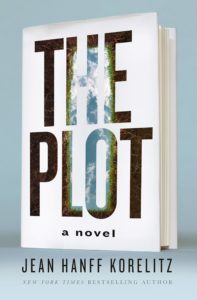
Jean Hanff Korelitz, The Plot
(Celadon Books)
Jean Hanff Korelitz wrote the novel behind HBO’s new series The Undoing, and her newest novel promises to deliver just as many surprises. In this wickedly clever tale of stolen genius, a disappointed writer working at a dead-end job doesn’t expect much from his MFA students—at least, until one of them dies, leaving his MOST promising manuscript behind. It only takes a little tinkering for Korelitz’s narrator to pass off the masterpiece as his own. Will the literary world ever learn of its true authorship? –MO
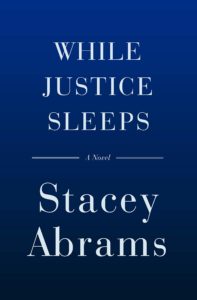
Stacey Abrams, While Justice Sleeps
(Doubleday)
We should all be thanking our lucky stars for Stacey Abrams! Not only was she instrumental in our last election (YEAH, GEORGIA), but she really led the charge against voter suppression. (Sorry, I know this list is already long, but if I may pile on one more recommended reading, it’s her previous book, Our Time Is Now: Power, Purpose, and the Fight for a Fair America. It will light a fire under your ass.) It might come as a surprise, then, to some of you that her next book is actually a novel. And NO, it’s not a romance, like her other wildly popular novels. (Why is Stacey Abrams THE ACTUAL COOLEST?!) This one takes the form of a legal thriller, set in the hallowed halls of the Supreme Court. Hey, Stacey Abrams can do anything. I’m all in. –Katie Yee, Book Marks Associate Editor
___________________________________
June
___________________________________
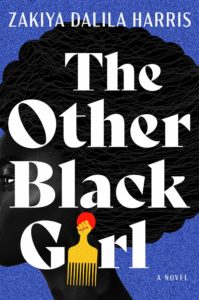
Zakiya Dalila Harris, The Other Black Girl
(Atria)
Zakiya Dalila Harris’s The Other Black Girl is a brilliant, twisty, and highly relevant thriller inspired by the author’s own experiences in working in the still very white world of publishing. An editor at a prestigious publishing imprint is elated when she finally gets another Black colleague, but her happiness quickly turns to confusion and trepidation when her coworker seems more interested in competing with her than helping her. Things get weirder when Harris’ heroine notices how strangely comfortable her colleague is in the white world, and starts getting notes on her desk telling her to leave the company—before it’s too late. Perfect for fans of Alyssa Cole’s When No One Is Watching, or Amina Akhtar’s #FashionVictim. –MO

Nekesa Afia, Dead Dead Girls
(Berkley)
I’m a big fan of Persia Walker’s Harlem Renaissance mysteries so I was psyched to see that Nekesa Afia is bringing the era back to crime fiction with her upcoming debut. In Dead, Dead Girls, waitress Louise Lloyd is working at two jobs—at a cafe and a speakeasy—and trying to forget her traumatic past. When young girls start turning up dead in a way that may be connected to her own near-escape from death years earlier, she must team up with a local detective to track down the killer, or fall under suspicion herself. I cannot wait to read this. –MO

Laura Lippman, Dream Girl
(William Morrow)
Laura Lippman took a break from fiction last year to publish a deeply thoughtful collection of essays, My Life as a Villainess. This year she’s back to standalone thrillers with Dream Girl, a book with “echoes of Misery,” according to the publisher’s description. A writer is recovering from an accident in his spare and hermetically sealed apartment, interacting only with his assistant and his nurse—that is, unless you believe the calls he’s getting from a character in his latest book are real…And then, of course, there’s the dead body he wakes up next to one morning. –MO
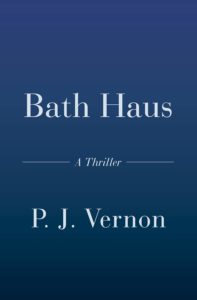
P.J. Vernon, Bath Haus
(Doubleday)
Vernon’s recovering addict protagonist, Oliver, is (seemingly) happily married to his loving husband. One day, temptation gets the better of him when he heads to a gay bath house, where a chance encounter turns into a violent attack that nearly leaves Oliver dead. His lies to his husband about what happened is just the start of his deceptions, in this sultry, queasy, thriller. I can’t wait to read it but perhaps I will not read it in public (as I may begin to blush). –MO
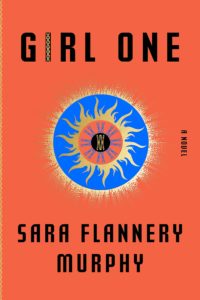
Sara Flannery Murphy, Girl One
(MCD)
This is the superhero take on 1970s feminism that we never knew we needed—and after reading it, I’m a bit shocked it hasn’t been done before! In Sara Flannery Murphy’s Atwood-esque thriller, nine women give birth on the “Homestead” without any contributions from men (except, of course, the mysterious male scientist tracking their progress). After the Homestead burns down, the women scatter. Decades later, their daughters must combine forces and develop their strange powers when they find themselves under attack from a menacing stalker. –MO
___________________________________
July
___________________________________
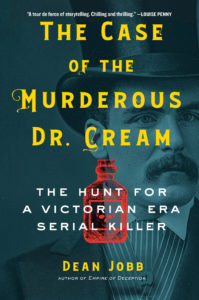
TRUE CRIME SPOTLIGHT
Dean Jobb, The Case of the Murderous Dr. Cream: The Hunt for a Victorian-Era Serial Killer
(Algonquin)
In Dean Jobb’s latest historical crime study, he takes on corruption, incompetence, and scientific advance in Victorian society, told through the lens of a chilling and fascinating story, the trial of one Dr. Thomas Neill Cream. Cream preyed upon Victorian ladies with mysterious illnesses and left a trail of poisoned patients in his wake, making him one of the era’s deadliest serial killers. Jobb’s narrative is built around his 1891 trial in London, but with a deft touch he takes on big ideas about the medical profession, forensics, and the tearing of the social fabric. Jobb’s true crime stories are not to be missed. –DM
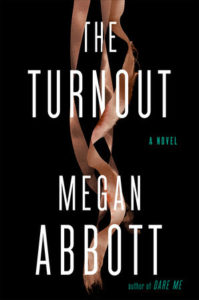
Megan Abbott, The Turnout
(Putnam)
Megan Abbott has already written about the high-stakes (and highly dangerous) sports of cheerleading and gymnastics, and now she turns her attention to the world of ballet. Abbott is not only a suspense author at the top of her game, she’s also a scholar, and The Turnout promises to be both homage to classic tropes and visionary model for their evolution. In this semi-gothic tale of a family-run ballet studio, two sisters teach the classes while their injured brother runs the office. Their parents died in a suspicious accident over a decade earlier, but suspicions and resentments need the arrival of an interloper, as well as a ballet season beset by disaster, in order to be let loose in their fully monstrous forms. –MO
___________________________________
August
___________________________________

Paula Hawkins, A Slow Fire Burning
(Riverhead)
Hawkins is fascinated with liminal spaces–those areas that are concerned with travel or transition. After her highly successful debut, The Girl in the Train, she then headed to the mashes for her sophomore novel, Into the Water, and now, in August’s upcoming release, she takes to the river with a murder on a houseboat. Three women have equal cause for revenge against the victim, and Hawkins eschews the usual red herrings to keep readers guessing till the end (that’s what I predict, anyway!).–MO









